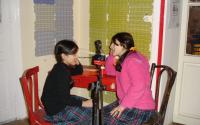9 November 2005One World South Asia
'Government and donor countries are curtailing progress towards Education for ALL ( EFA) – and broader poverty reduction - by according only marginal attention to the 771 million adults living without basis literacy skills,' says the fourth edition of the EFA Global Monitoring report, Literacy for Life'. 'The powerful links that exist between adult literacy and better health, higher income, more active citizenship and children's education should act as strong incentives for governments and donors to be much more proactive in addressing the literacy deficit,' says UNESCO's Director-General Koichiro Matsuura at the launch of the report in New Delhi on November 9, 2005. According to the report, three quarters of the worlds adult illiterates live in 12 countries. South and West Asia has the lowest adult literacy rate in this region (58.6%), followed by Sub-Saharan Africa (59.7%), and the Arab states (62.7%). Countries with the lowest adult literacy rates in the world are Burkina Faso (12.8%), Niger (14.4) and Mali (19%). Reflecting deep seated gender inequalities in many societies, women account for 64% of the adults worldwide who cannot read or write with understanding. This figure is virtually unchanged from 63% in 1990. Among the 163 countries for which data was available in 2002, 47 have achieved Universal Primary Education (UPE). Projections show that only twenty additional countries are likely to achieve UPE by 2015. The relative neglect of adult literacy programmes stems from the global drive to expand universal primary education. There is a widespread belief that investing in primary-level education is more cost effective. Recent studies, however, find that the cost of educating an adult is on par with that of a primary school child (US$50), and that such spending has a positive effect on individual earnings and economic growth. The report calls for dramatic scaling of youth and adult literacy programmes, requiring more domestic resources and improved status of literacy educators. It also points out that programmes that provide initial learning in the mother tongue are pedagogically sound but must allow for a transition to more widely used regional or national languages. According to a survey conducted by the report, while there is increased backing for the UPE, literacy is not high on the agenda of bilateral donors. However, accelerating progress towards Education for All needs the commitment and backing of national and international players. Bilateral aid to basic education almost trebled between 1998 and 2003, but still accounts for less than 2% of the total Official Development Assistance (ODA). Overall, nearly 60% of bilateral commitments for education are still for the post-secondary levels, and this doubles the allocations for basic education. Assuming that the share of funding that goes to basic education remains constant, the increased overall aid flows pledged at the G8 Summit in Gleneagles in July 2005 could by 2010 result in an annual total of only US$ 3.3 billion for basic education, still far short of the $7 billion estimated necessary to achieve the UPE and the gender goals alone.
User comments
"Multiple languages & literacy: transitional or additive approaches?"Author:Don Osborn Time:10.11.2005 05:36 Comment:Re this quote from the article, "Literacy: a right still denied to nearly one fifth of the world's adult population": "It also points out that programmes that provide initial learning in the mother tongue are pedagogically sound but must allow for a transition to more widely used regional or national languages." There is no disputing the utility of languages of wider communication (LWCs) but it would be a mistake to consign literacy in minority, indigenous, and ethnic languages (MINELs) - many people's mother tongues - to mere "transitional" status. A happier wording for the abovequoted sentence, which would keep open the possibilities of working towards full bilingual or multilingual literacy would be "...must allow for addition of skills in more widely used regional or national languages." Multilingual literacy (and, more broadly, education) is challenging, but arguably meets many people's realities better than transitional approaches, let alone literacy strategies that ignore first languages altogether. A list for such issues is at http://groups.yahoo.com/group/Multilingual_Literacy/ |






